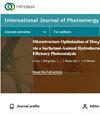Effects of Different Particle-Sized Al Powders on Sintering Properties of Aluminum Paste in Crystalline Silicon Solar Cell
IF 2.1
4区 工程技术
Q3 CHEMISTRY, PHYSICAL
引用次数: 1
Abstract
In this paper, the effects of particle size difference of aluminum (Al) powder on physical properties of Al powder and sintering properties of Al paste were investigated. For this purpose, respectively, Al powders with four mean particle sizes were used, which were obtained by two classifications using the same nitrogen atomization process. Thermal analysis results showed that the smaller the Al particle size, the lower the oxidation temperature and the higher the reaction enthalpy, indicating higher reactivity of the Al powder. Four Al powders were prepared into Al paste by the same process, and the resistances of the paste increased with the decrease of the particle size of the aluminum powder. Electrochemical capacitance-voltage profiler (ECV) and scanning electron microscope (SEM) analysis showed that the smaller the Al particle size, the thicker the back surface field (BSF) and the higher the doping concentration of BSF. It was found that the smaller size of Al powder limited the migration of silicon, which resulted in higher concentration of silicon (Si) in the Al-Si liquid phase. This leads to reaching a balance at a higher temperature between the recrystallization of silicon from the alloy liquid and the dissolution of silicon in the liquid alloy and a higher doping concentration and a higher effective BSF doping thickness. Results of the study will provide reference for further study and application of Al paste.不同粒径铝粉对晶硅太阳能电池铝浆烧结性能的影响
本文研究了铝粉粒度差异对铝粉物理性能和铝浆烧结性能的影响。为此,分别使用具有四个平均粒度的Al粉末,它们是通过使用相同的氮气雾化过程的两种分类获得的。热分析结果表明,Al颗粒尺寸越小,氧化温度越低,反应焓越高,表明Al粉末的反应活性越高。采用相同的工艺将四种铝粉制备成Al糊剂,糊剂的电阻随着铝粉粒度的减小而增大。电化学电容电压剖面仪(ECV)和扫描电子显微镜(SEM)分析表明,Al颗粒尺寸越小,背表面场(BSF)越厚,BSF的掺杂浓度越高。研究发现,较小尺寸的Al粉末限制了硅的迁移,从而导致Al-Si液相中硅(Si)的浓度较高。这导致在更高的温度下在硅从合金液体的再结晶和硅在液体合金中的溶解之间达到平衡,以及更高的掺杂浓度和更高的有效BSF掺杂厚度。研究结果将为铝浆的进一步研究和应用提供参考。
本文章由计算机程序翻译,如有差异,请以英文原文为准。
求助全文
约1分钟内获得全文
求助全文
来源期刊
CiteScore
6.00
自引率
3.10%
发文量
128
审稿时长
3.6 months
期刊介绍:
International Journal of Photoenergy is a peer-reviewed, open access journal that publishes original research articles as well as review articles in all areas of photoenergy. The journal consolidates research activities in photochemistry and solar energy utilization into a single and unique forum for discussing and sharing knowledge.
The journal covers the following topics and applications:
- Photocatalysis
- Photostability and Toxicity of Drugs and UV-Photoprotection
- Solar Energy
- Artificial Light Harvesting Systems
- Photomedicine
- Photo Nanosystems
- Nano Tools for Solar Energy and Photochemistry
- Solar Chemistry
- Photochromism
- Organic Light-Emitting Diodes
- PV Systems
- Nano Structured Solar Cells

 求助内容:
求助内容: 应助结果提醒方式:
应助结果提醒方式:


